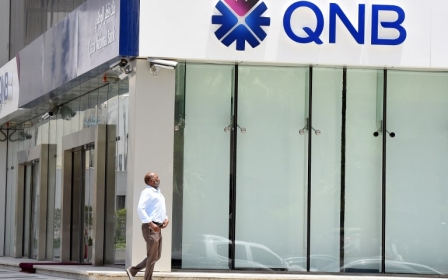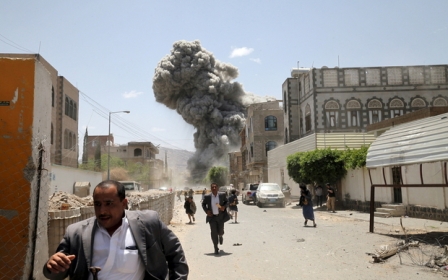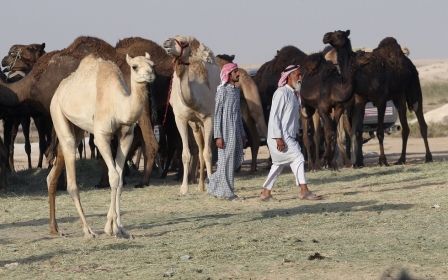Qatar crisis: Saudi-led states list 13 demands to end blockade
Four Arab states boycotting Qatar over alleged support for terrorism have sent Doha a list of 13 demands including closing Al Jazeera, reducing ties to Iran and ending military cooperation with Turkey, an official of one of the four countries said.
The list also reportedly calls for the closure of Middle East Eye, which it says Qatar backs "directly or indirectly", compensation to all four petitioning countries and a severing of all links with the Muslim Brotherhood group.
The demands appear designed to quash a two-decade foreign policy with which Qatar has punched well above its weight, striding the stage as a peace broker, often in conflicts in Muslim countries.
The list compiled by Saudi Arabia, the UAE, Egypt and Bahrain also demands the closing of a Turkish military base, the official told Reuters.
Turkey has since rejected these calls. "Strengthening the Turkish base would be a positive step in terms of the Gulf's security," said Turkey's defence minister, Fikri Isik. "Re-evaluating the base agreement with Qatar is not on our agenda."
Al Jazeera said the demands were an intimidation, and "nothing but an attempt to silence the freedom of expression in the region". The London-based Middle East Eye said the demands were an "attack on something we in Britain call a free press".
Qatar must also announce it is severing ties with "terrorist", ideological and sectarian organisations including the Muslim Brotherhood, Islamic State group, al-Qaeda, Hezbollah and Jabhat Fateh al-Sham, formerly al-Qaeda's branch in Syria, he said, as well as surrender all designated terrorists on its territory.
Doha's independent-minded approach, including a dovish line towards Iran and support for some political Islamist groups, in particular the Muslim Brotherhood, has incensed some of its neighbours who may view political Islamism as a threat to their dynastic rule.
Saudi Arabia, Bahrain, UAE and Egypt imposed a blockade on Doha earlier this month, closing their airspace and territorial waters to Qatari planes and ships. They have also severed diplomatic ties with the small Gulf state.
Calls for de-escalation
Following the release of the demands, UK foreign secretary Boris Johnson called on Gulf states to discuss "measured and realistic" demands to de-escalate tensions.
In a statement released on Friday, Johnson said: "The current tensions in the Gulf must be allayed for the sake of regional stability. Gulf unity can only be restored when all countries involved are willing to discuss demands that are measured and realistic."
"The UK calls upon the Gulf states to find a way of de-escalating the situation and lifting the current embargo and restrictions, which are having a real impact on the everyday lives of people in the region," he added.
As the crisis entered its fifth week, the US state department had on Tuesday urged the states allied against Doha to make their demands public and detail their accusations against Qatar.
The UAE's foreign minister, Anwar Gargash, on Thursday listed a few of the Gulf allies’ grievances in an interview with Saudi-owned AlHayat newspaper. He said the US had erred when it asked Gulf nations to release the demands. He said the list had already been handed over to Washington, which he said had promised to correct Tuesday’s statement.
A report by the AP news agency added that the list stipulates Qatar must sever diplomatic ties with Iran as well as repay an unspecified amount of money to the boycotting countries. The list also says that each demand must be complied with within 10 days.
The list commands Qatar to halt funding of other publications, including Middle East Eye. Middle East Eye is not funded by Qatar, a spokesman for the British company said.
According to the list, Qatar must refuse to naturalise citizens from the four countries and expel those currently in Qatar, in what the countries describe as an effort to keep Qatar from meddling in their internal affairs.
AP said the list came from "one of the countries involved in the dispute".
Although in his interview, Gargash repeated ambiguous accusations about Doha supporting terrorism, he also mentioned specific groups in Libya, including Shura Benghazi - a coalition of Islamist militias that include factions blacklisted by the US. Doha denies supporting terrorist groups.
Gargash called on Qatar to stop harbouring individuals who are sanctioned regionally and internationally for terrorism, as he put it. He cited a list of 59 Qatar-linked individuals and groups that included Doha-based charities.
He described Doha as a "safe haven" for extremism.
Gargash also criticised Qatar’s support for the Palestinian Islamist movement Hamas. “The demands also relate to dragging the Gulf into radical policies with Hamas and supporting the Muslim Brotherhood,” he told AlHayat. “The main concern for these demands is to stop Qatar from supporting terrorism.”
The Emirati minister referenced a move towards firmness in the international approach to terrorism, saying that fighting extremism has become a priority for the United States.
Although the US state and defence departments are calling for a swift end to the crisis, President Donald Trump has voiced full support for the Saudi-led sanctions against Qatar, accusing Doha of historically funding terrorism "at a very high level".
Gulf officials have also accused Qatar-based media outlets, namely Al Jazeera, of promoting extremism and interfering in the internal affairs of Egypt and Bahrain, among other countries.
Gargash denounced Al Jazeera, but did not elaborate on whether closing the network is among the demands for ending the diplomatic impasse.
"It is a news broadcast for the Muslim Brotherhood. It’s not what it used to be 10 years ago," he said. "It is a mouthpiece for extremism. It has whitewashed personalities that have become symbols for terrorism."
The UAE foreign minister described the deployment of Turkish troops to Qatar after the blockade as a “dangerous development”, saying that Ankara is trying to take advantage of the crisis to expand its regional influence, but it also wants to maintain its relations with Saudi Arabia.
Qatari officials did not reply immediately to requests for comment. But on Monday, foreign minister Sheikh Mohammed bin Abdulrahman al-Thani said Qatar would not negotiate with the four states unless they lifted their measures against Doha.
New MEE newsletter: Jerusalem Dispatch
Sign up to get the latest insights and analysis on Israel-Palestine, alongside Turkey Unpacked and other MEE newsletters
Middle East Eye delivers independent and unrivalled coverage and analysis of the Middle East, North Africa and beyond. To learn more about republishing this content and the associated fees, please fill out this form. More about MEE can be found here.




